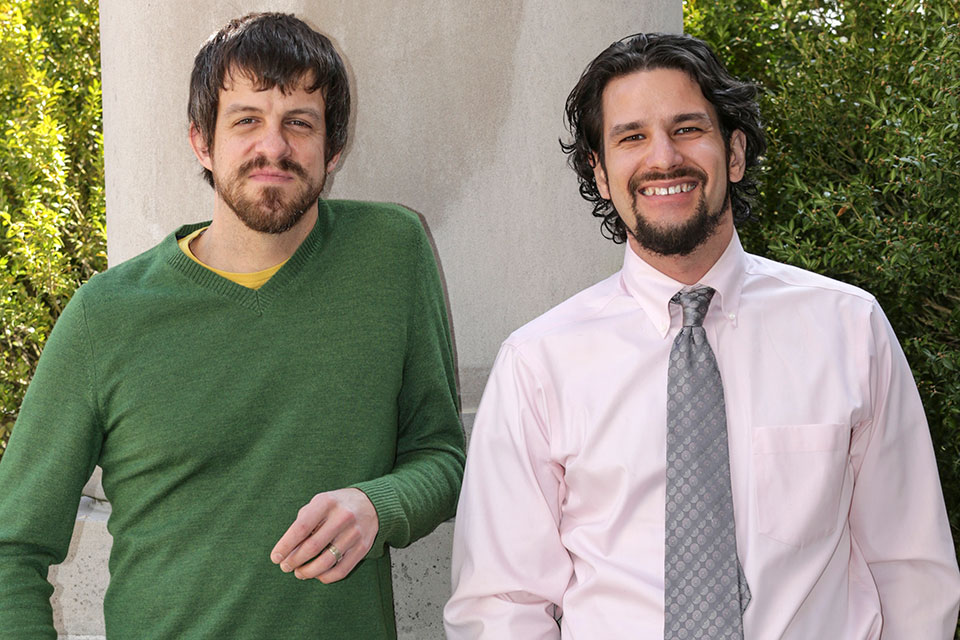New search engine delivers content matched to ability

Dr. Philip Kovacs, left, and Dr. Ryan Weber are the UAH developers of Complexity Engine.
Michael Mercier | UAH
HUNTSVILLE, Ala. (Feb. 27, 2014) – An Internet search engine developed specifically for schools by two University of Alabama in Huntsville professors is being tested as a way to increase reading abilities in challenged students and help motivate intellectual development in gifted students, while saving schools money on textbooks.
Complexity Engine has been awarded a $10,000 development grant from the UAH Charger Innovation Fund and is in the final round of vying for an Alabama Launchpad grant. Launchpad is a program of the Economic Development Partnership of Alabama to promote, reward and increase the pipeline of high-growth, innovative ventures that have the potential to grow and thrive in the state.
"We just have a host of features we want to roll out with Complexity Engine and that's why winning the Launchpad competition is essential," says developer Dr. Philip Kovacs, an associate professor of education who conceived the system and is collaborating with Dr. Ryan Weber, an assistant professor of English, to develop it. Tripp Roberts, a Georgia Institute of Technology computer science junior, collaborates to produce the necessary software.
Complexity Engine uses a sophisticated algorithm to search websites for content and delivers free, customized and age-appropriate reading materials to a user's computer. It promises to give teachers, parents and students an efficient, affordable way to promote reading. Teachers and administrators can set parameters for the search results, and the reading experience can be either student self-directed or guided by the teacher.
"What we're developing is a way to get through the nonsense and junk online and get to the learning material," says Dr. Kovacs. Complexity Engine is currently in testing with 500 gifted fifth and sixth grade students at a mid-sized regional school system.
"The reason the school system wanted to use it is because they have a hard time finding challenging material for their gifted students," Dr. Kovacs says. "The second issue with this group of students is that if you go and search the web for 'submarine,' you will get thousands of results that are all over the place compared to what you want to find. With our search engine, you will get around 150 results that are more closely about what you were searching for."
Teachers and administrators get feedback from the program about a student's reading material. The reading comprehension level of each file retrieved is scored. "That score is composed using a variety of reliable measures of reading score," Dr. Weber says. Over time, the teacher can assess a student's reading progress from that information.
The idea for Complexity Engine arose four years ago, when Dr. Kovacs was studying ninth-grade at-risk students who were reading at a second through sixth grade level. Rather than conventional schooling, students in the study picked their own topics of interest and researched them on the web. They made class presentations on those topics during the year.
The study found that in a control group of students reading comprehension increased 11 percent, but in the experimental group, it zoomed 59 percent.
"We know that reading is fundamental to the educational development of students because lots of studies have shown that to be true," says Dr. Kovacs. "So then you ask, how do you make the Internet so that teachers can provide the right level of materials for a student's reading level for free?"
We know that reading is fundamental to the educational development of students because lots of studies have shown that to be true. So then you ask, how do you make the Internet so that teachers can provide the right level of materials for a student's reading level for free?
Dr. Philip Kovacs
Associate professor
Education
Its developers see Complexity Engine as a replacement for textbooks that offers a less regimented, more varied and interest-driven educational model to students.
"The information a student gets is no longer generic, like it is from a textbook," says Dr. Weber. "The individual students can search for reading material that matches their interests, so they can be more self-motivated readers."
Motivation is a major reason students drop out of high school, Dr. Kovacs says. "Many students who leave school don't do it because they can't do the work. They do it because they are not challenged by it and they are not motivated to learn. They get bored."
During the earlier study, researchers found that behavioral problems dropped and parents who had never attended parent-teacher conferences began attending to compliment the teachers.
"My favorite student compliment we used to get was, 'I love your class because we don't have to work,'" says Dr. Kovacs. "Of course everyone was working very hard, but it seemed to them like it wasn't work because they were engaged."
Complexity Engine works toward the same ends.
"We are creating the circumstances for motivation to appear," says Dr. Kovacs, citing autonomy, a sense of purpose and a sense of mastery as essential to creating conditions for motivation to manifest. "A lot of kids who are really smart learn to hate school. How can we as teachers show them how to learn a thousand times better?"
The pair found plenty of help on campus for their project, says Dr. Weber, who cites the roles of Director Kannan Grant and Research Program Coordinator Becky England of the Office of Technology Commercialization (OTC), as well as Dr. John Whitman, visiting assistant professor of management at the UAH College of Business Administration.
"We could not have done this without all the intellectual support and the resources that are available to us on the campus," says Dr. Kovacs. "Alabama Launchpad has also been a tremendous resource in helping us to refine our idea and concept."
For more information, contact:
Dr. Philip Kovacs
256.824.2331
philip.kovacs@uah.edu
OR
Dr. Ryan Weber
256.824.6934
ryan.weber@uah.edu
OR
Jim Steele
256.824.2772
jim.steele@uah.edu
